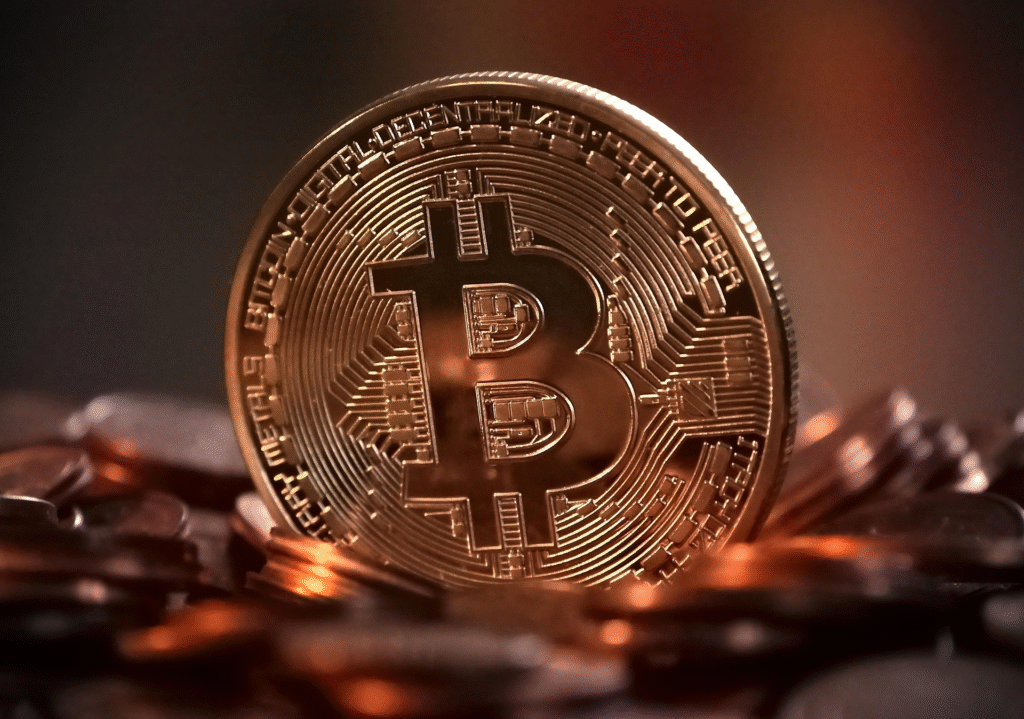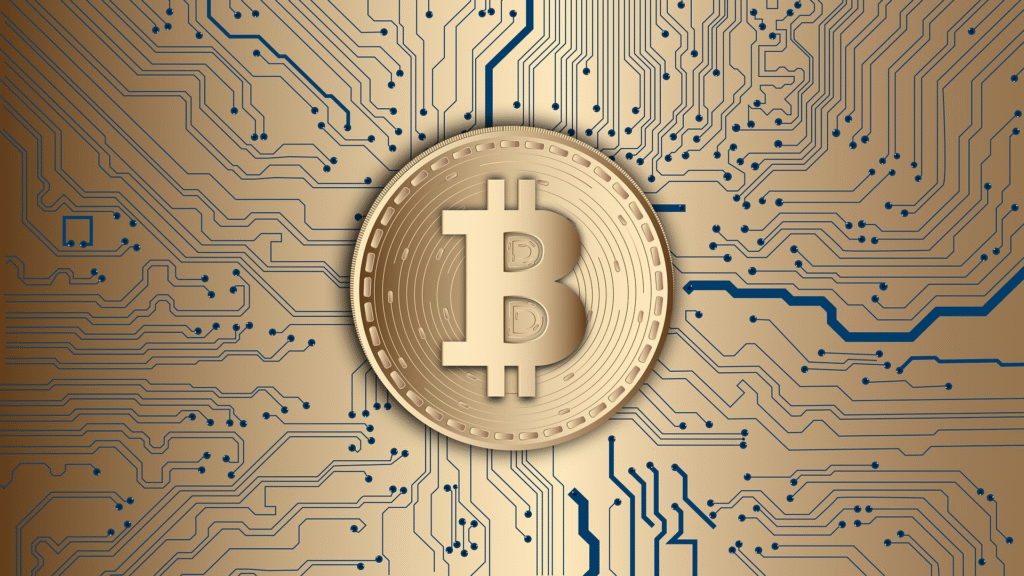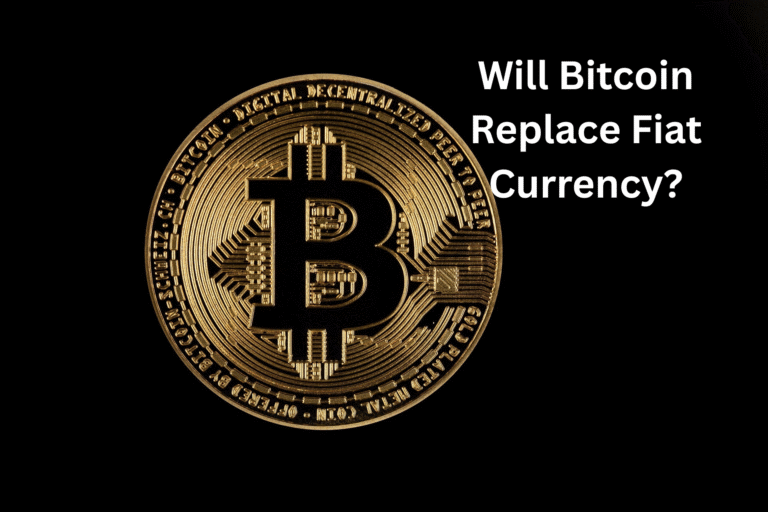Will Bitcoin Replace Fiat Currency?: Since its 2009 debut, Bitcoin has challenged the conventional notion of money and become a disruptive force in global banking. Decentralized, transparent, and inflation-resistant, proponents view it as the currency of the future, while detractors highlight its volatility, scalability issues, and regulatory challenges.
The question of whether Bitcoin can actually replace government-issued money emerges as confidence in fiat currencies and central banks falters in some regions of the world. The main arguments for and against Bitcoin being a widely accepted substitute are examined in this article, along with whether or not it has the capacity to completely replace fiat money in the global economy.
Will Bitcoin Replace Fiat Currency?

Bitcoin has captured the attention of investors, technologists, economists, and the general public since its launch in 2009. Bitcoin is a radical break from conventional monetary systems, hailed as “digital gold” by some and a speculative bubble by others. The argument over whether Bitcoin will eventually replace fiat money is growing along with its acceptance.
Will Bitcoin Replace Fiat Currency?: Although Bitcoin provides a decentralized, international, and censorship-resistant form of currency, its widespread replacement of fiat is severely hampered by the complexity of contemporary economies, legal systems, and consumer behavior. The technological, economic, political, and social aspects that affect whether Bitcoin could eventually overtake all other forms of currency are examined in this article, which examines all sides of the argument.
What is Fiat Currency?
Although Bitcoin provides a decentralized, international, and censorship-resistant form of currency, its widespread replacement of fiat is severely hampered by the complexity of contemporary economies, legal systems, and consumer behavior. The technological, economic, political, and social aspects that affect whether Bitcoin could eventually overtake all other forms of currency are examined in this article, which examines all sides of the argument.
Since fiat money is legal tender, it must be accepted as payment for debts. Central banking policies including controlling inflation, regulating the money supply, and setting interest rates are usually used to regulate its value.
What Makes Bitcoin Different?
Bitcoin differs fundamentally from fiat currency in several ways:
- Decentralization: There is no central authority or government that issues or controls Bitcoin.
- Limited Supply: Only 21 million Bitcoins will ever exist, making it deflationary in nature.
- Transparency and Security: Bitcoin transactions are recorded on a public blockchain and are verified by a distributed network of nodes.
- Borderless and Permissionless: Anyone with internet access can use Bitcoin, regardless of geography or banking status.
These features have led Bitcoin enthusiasts to argue that it is superior to fiat in terms of security, transparency, and long-term value.
The Case For Bitcoin Replacing Fiat

(1) Erosion of Trust in Central Banks.
Many people have become more dubious of governments and central banks in recent decades, particularly during periods of financial crisis, hyperinflation, or careless monetary policy. People are looking for other places to get their money because of the disastrous currency devaluations in countries like Argentina, Zimbabwe, and Venezuela. Bitcoin presents a viable remedy because of its limited quantity and lack of governmental regulation.
(2) Financial Inclusion.
Globally, there are still about 1.4 billion unbanked people. Without requiring a conventional bank account, Bitcoin provides a decentralized and easily accessible financial network that allows users to transmit, receive, and save money. In areas with weak banking infrastructure, this might have a revolutionary effect.
(3) Technological Integration.
A digital-native currency is becoming more and more appealing as technology becomes more and more integrated into daily life. Bitcoin offers real-time, inexpensive, and international transactions and is easily connected with cellphones, digital wallets, and internet platforms. The Lightning Network’s development significantly improves Bitcoin’s usability and scalability for small-scale transactions.
(4) Inflation Hedge.
Bitcoin is a desirable inflation hedge due to its deflationary characteristics. The quantity of Bitcoin is limited, in contrast to fiat currencies that can be issued indefinitely. Many investors are looking to Bitcoin as a long-term store of wealth as their fears about fiat currency devaluation grow, especially during periods of quantitative easing.
The Case Against Bitcoin Replacing Fiat.
(1) Volatility.
The volatility of Bitcoin is well known. It is not practical for regular purchases or salary payments because its price can fluctuate by 5–10% in a single day. If a currency’s value varies significantly from week to week, people are unlikely to adopt it for everyday use.
(2) Lack of Legal Status.
The majority of governments do not accept Bitcoin as legal cash, despite the fact that it is accepted as a legitimate payment method in several nations. Bitcoin cannot take the role of fiat in official tax systems, judicial settlements, or government payments unless it is approved by the government. One of the greatest obstacles to widespread adoption is still the absence of legal recognition.
(3) Scalability Issues.
Bitcoin still has scalability issues despite innovations like the Lightning Network. Unlike Visa, which processes over 24,000 transactions per second (TPS), the Bitcoin network can process about 7 TPS. Because of this restriction, Bitcoin finds it challenging to handle the volume of transactions associated with a global economy.
(4) Environmental Concerns.
An enormous amount of energy is used in bitcoin mining. Its energy footprint is unsustainable, according to critics, particularly when contrasted with more energy-efficient payment methods. The environmental impact is still a controversial topic, even though some mining operations employ renewable energy.
(5) Regulatory Resistance.
Central banks and governments have a stake in keeping monetary policy under control. This authority would be compromised by a move to a decentralized currency like Bitcoin. To stop such a shift, it is very possible that influential organizations will oppose or tightly regulate Bitcoin.
A More Realistic Scenario: Coexistence.
Rather than a complete replacement, many experts foresee a world where Bitcoin and fiat currencies coexist. In this model, Bitcoin serves as:
- A store of value like gold
- A hedge against fiat currency devaluation
- A tool for cross-border transfers and remittances
- A niche payment system in specific industries or communities
Because of their legal position and comparatively stable value, fiat currencies would continue to dominate daily commerce, taxation, and government operations. Bitcoin would act as a substitute or supplementary financial asset in the interim.
Bitcoin as a Reserve Asset?
The notion of Bitcoin as a digital reserve asset, either in addition to or instead of conventional reserves like gold or the US dollar, is a new concept. Bitcoin is already in the reserves of some businesses (like MicroStrategy) and even nations (like El Salvador).
Although it will not completely replace cash, additional nations adopting Bitcoin in this way might boost worldwide.
Conclusion.
So, will Bitcoin replace fiat currency?
The short answer: not entirely, and not anytime soon.
Bitcoin is a significant invention in the financial industry because of its special qualities. It questions the conventional understanding of money and provides a substitute when fiat currencies are ineffective. However, there are several logistical, legal, and financial obstacles in the way of globally replacing fiat money.
Bitcoin is much more likely to supplement fiat currencies than to completely replace them. Bitcoin will probably become more significant in the global financial system—but within a varied and changing monetary landscape—as digital technologies develop and institutional trust erodes.
Final Thoughts.
The popularity of Bitcoin has spurred important discussions about freedom, control, and money. Its existence has already compelled central banks to innovate (see: CBDCs).
Ultimately, the future of money might not be a simple binary decision between fiat and Bitcoin.

